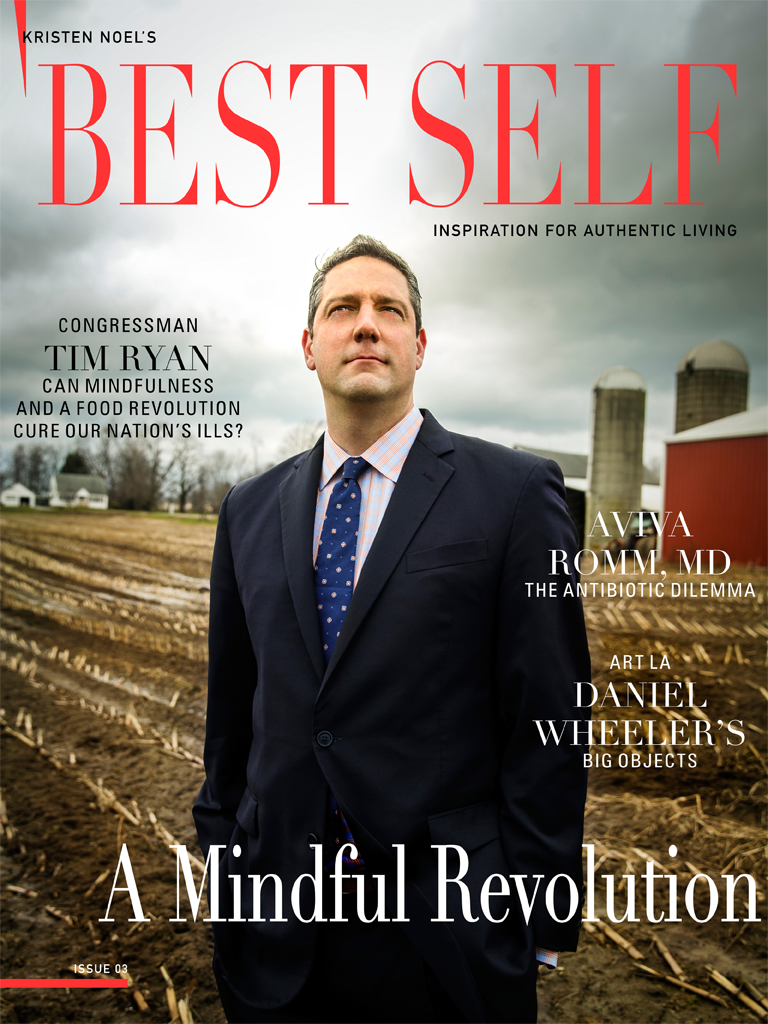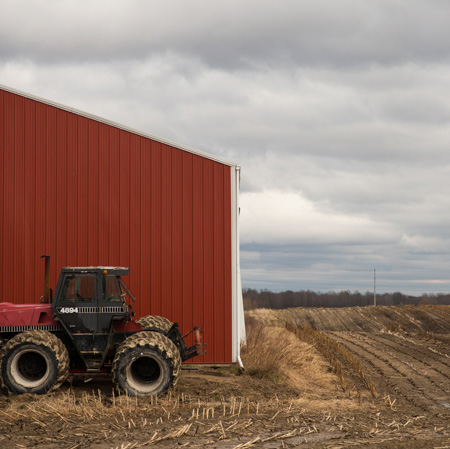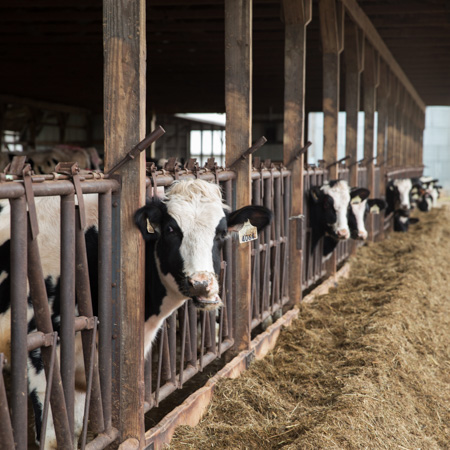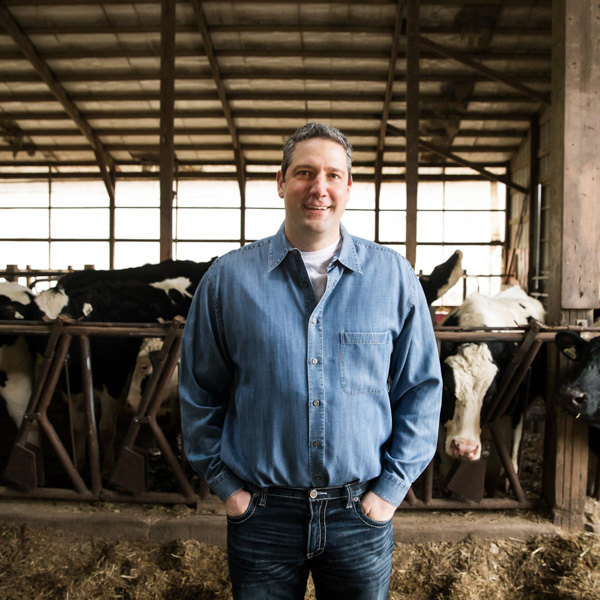Congressman Tim Ryan
Interview by Kristen Noel
Warren, Ohio, January 4, 2015
Photographs by Bill Miles
Real food is not only about agriculture and nutrition. It’s about a way of life that connects us back to the earth, to each other, to our communities, and to what really matters. It’s about slowing down and really tasting life. It’s about the joy of living.
~ Congressman Tim Ryan / The Real Food Revolution
With two books under his belt, A Mindful Nation and The Real Food Revolution, and having just been sworn into his seventh term as a United States Congressman – Tim Ryan is poised to lead, what we have dedicated our issue to, a “mindful revolution.”
A bright light in the body politic and in the world, he uses his unique position on the stage of national politics for good, to create a movement that affects us all and the direction our nation is taking as a whole. The issues most important to Congressman Ryan transcend party lines and demographics – these are human issues impacting the food system of our country that are trickling down to our overall health and well-being. He is not afraid to get his hands dirty and even stand in borrowed muck boots in a muddy cornfield on a freezing cold January day for our cover shoot – all in the name of embodying the change he wants to see.
The Real Food Revolution isn’t solely about shining the spotlight on the pervasive issues, it’s not about applying Band-Aids, but rather it is a plethora of resources and solutions.
Congressman Ryan has identified a runaway train and is willing to stand in its path and take it on. But rest assured, he is not alone. He has garnered the powerful support of experts who are willing to stand staunchly at his side, among them Hollywood filmmaker Laurie David (Fed Up), New York Times best-selling author and personal doctor to Bill and Hillary Clinton, Dr. Mark Hyman, activist Michael Pollan, celebrity chef Tom Colicchio, former President Bill Clinton, Wanderlust founder Jeff Krasno, and wellness revolutionary Kris Carr, to name a few. Judging by his list of diverse supporters, it’s apparent that his vision for America has both momentum and mojo. This is a train that needs to be stopped – and there is a strong movement crossing its tracks.
But the beauty is that he recognizes that this is not just a food issue – Congressman Ryan sees the interconnectedness of what’s on our plates with all aspects of our lives – the health of our bodies, our economy, the overall productivity of our country – linking the basic tenets of the world we live in.
________________________

Kristen: This little book with the charming farm cover is a powerhouse, a call to action. Packed with staggering statistics and realities of our current food system, counterbalanced with initiatives — practical strategies and ideas — it is all tied up in a bow that elicits our own childhood memories, family traditions, and cooking ceremonies. After taking copious notes in preparation for this interview, I quickly realized I would need to sit here with you for a week to touch on even a fraction of the relevant topics you have covered. I’ll home in on one – our children and the legacy we are leaving them.
Congressman: This is what it’s all about – how do we shift this so that our children can move into a world where health is valued. We have a lot of problems that seem complicated, and many times in Washington we think that if we come up with a more complicated, more complex solution that this will fix the complicated problem. But this is not the right way to think about this. How do we get back to fundamentals? How do we simplify? How do we just stop and take a deep breath and say, okay – are these all interconnected? [This coming from the man who has brought meditation and Deepak Chopra to the nation’s capital.]
In Washington, we had a huge discussion about healthcare a few years ago and there was not much in that discussion about food at all. Now how can you have a healthcare discussion and NOT talk about food, a food-policy discussion and NOT talk about health? To me this is about looking at these two issues together as interconnected.
Kristen: Let’s address the “un-health” of our nation, and our children. Let’s start linking what we are putting on our forks with our health. As you highlight in the book, we are raising the first generation that will not live as long as their parents. They are inheriting a diet that has been making us sick.
There is one place where nearly everything that matters today in the world converges: our fork.
~ Mark Hyman, M.D.
Congressman: If we are going to shift the culture, we need to teach. It starts with schools – how do we get a garden in every school, a salad bar in every cafeteria…how do we tie it into our curriculum – math, science, home economics 2.0?
Kristen: I am fortunate to live in the Hudson Valley, a region dense in awareness: Our schools have gardens, we are surrounded by farms, and we have implemented farm-to-table initiatives. Our middle school / high school food manager, Christine Downs, advocates tirelessly to implement whole ingredients and to remove unhealthy options. We have a salad bar, community support, there is momentum to incorporate this into the curriculum…and yet, even with all of this, we are still met head on with financial realities. Our work has just begun. This all costs money. It costs four times as much to purchase organic food. Schools have budgets with very little wiggle room. Schools need help.

Congressman: This is really pulling back the curtain in Washington: We take taxpayer dollars and subsidize certain crops — corn, wheat, soy — in big numbers. These crops are not inherently bad, but they are the feedstock for the processed foods — the multiple processed foods that Dr. Mark Hyman calls “food-like substances.”
Kristen: [laugh] And that’s being kind.
Congressman: In the next few years, half the country will have diabetes and pre-diabetes. We’ve seen staggering increases in chronic diseases. Then we take taxpayer money to subsidize healthcare to take care of the people getting sick from eating the cheap, artificially processed food. It’s a vicious cycle. In a real food revolution we are saying, take that taxpayer money and subsidize beneficial crops – fruits, vegetables, nuts – the kind of healthy food that is medicine for our body, with the vitamins, minerals, and the good fats that we need.
And I think the taxpayer, whether a Democrat, Republican, liberal, or conservative, should be recognizing that we are spending all of this money and getting really bad health outcomes. We need to make this investment. We need to make sure our farmers are secure and that means creating markets for them. We need to create a farm-to-school initiative and blow it up, creating built-in markets for local farmers and then expanding them to other institutions – hospitals, universities, prisons, and so on.
Kristen: This is such an exciting prospect, a no-brainer – open up the market.
Congressman: Here’s the delicate balance between liberals and conservatives. I do think that the government has to initiate this. We don’t have to run it, but we do need to provide seed money for the schools to put in a garden, a salad bar, to build a kitchen – to help connect the local farmer to the school. You may need an employee at the school that can help connect the two — that will take some investment. In the inner city, rural, and poor school districts, we sometimes have 80 to 90 percent of the kids already in the Medicaid program. And we’re feeding them crappy food. We know they are going to get diabetes — they live in a neighborhood that doesn’t have a grocery store for a mile or two – what we call “food deserts.” So here’s a kid in a tough neighborhood, poor, no grocery store around, no local ag, no urban ag — they go to school, they eat Doritos, pop [soda, if you are not from the Midwest], and a fruit roll-up and we expect them to learn algebra? Not only are they not going to learn, we know that in 10 to 15 years they are probably still going to be in the Medicaid program, they’re going to have diabetes and probably be obese, and now the taxpayer is going to have to take care of it. So why wouldn’t we use some of the Medicaid money and do something about it on the front end? Let’s bend the cost curve in the Medicaid system. Government needs to reinvent itself and get innovative to figure out ways to do this.
I do not blame the citizen – the average consumer or taxpayer – for not being able to navigate a system that is rigged against them.
American food policy has long been rife with head-scratching illogic.
~The New York Times
Kristen: We need to be proactive, to find new ways of looking at things. You use the term “food racism” in the book. Bridging the gap between organic and non-organic food shouldn’t be a socio-economic issue. We should all have access to it. School is the one place we should be able to depend upon to provide our children with a healthy meal.
Congressman: We can level the playing field by creating domestic markets for domestically produced healthy food: just a farmer, some product, and a local market to sell it. In a decade, we will be looking at a healthcare system that will be supporting 40 percent of the population afflicted by diabetes. We will be spending all of our taxpayer revenue on healthcare. We are not prepared for where this is leading us as a country. There will be no money for research and development, roads and bridges, alternative energy, Pell grants. We can’t sustain this current model. There won’t be anything left for the things we need to invest in, in order to be a strong and vibrant country.
We need a revolution in thinking. We need to look at this differently – to see what is possible, to see opportunities, to partner with our inner cities. There are exciting initiatives underway — cleaning up neighborhoods, opening up the green spaces, investing in urban agriculture – transforming areas of consumption into areas of production. Taking down the crime-infested drug houses, reducing the burden on safety services. Now you have farming in the city, now you have employment – summer jobs, after-school jobs, growing healthy food. Teach them how to sell – how to create a business.
I don’t want to just give them a healthy meal – I want to give our kids the tools to change their lives.
Kristen: This is how you participate in a revolution. It is about empowerment – it isn’t about a handout.
Congressman: It’s about creating this new culture of thinking.
Kristen: It’s an awakening. We’re missing the accountability piece where we ask the questions: Why am I not feeling well? What’s my role in this?
Congressman: We don’t slow down enough. It’s important to have that quiet time in our schools – to check in and feel what’s going on, to become aware. This is an essential skill to have – to be able to stop and to have that inner peace. There has been tremendous success in schools with kids who meditate.
Kristen: This is igniting a spark that forces us to ask ourselves why the kids are lethargic, distracted, tired, and acting up. And then to add insult to injury, we all have our faces embedded in electronic screens.

Congressman: [laugh] If we just took five minutes each day to turn off the phone, TV, radio – whatever, just for five minutes – sit, close our eyes and just be. You start noticing things. Why are we continuing to go down this road?
I think that you see a real negativity toward politics right now because there aren’t any ideas that are exciting.
Kristen: [pointing to the book] There’s a big one right here!
Congressman: [laughing] We are trying to provide ideas that are solutions — REAL solutions, things that are going to shift the country at a deep level and improve your life, your kids’ lives, your kids’ health – improve their prospects for learning, going out into the world, and being successful.
Kristen: My teenage son will be rolling his eyes as he reads this, but my question is, why do we have junk food in the schools in the first place? Why don’t we just remove it completely? Even schools with great consciousness, those that have removed the sugary drink-vending machines and have implemented healthy initiatives, still serve up processed foods. The majority of kitchens in public schools don’t cook food, they warm “things” up.
Congressman: It boils back down to budgets and funding, but the real question is what is it really costing us in the end? We have to provide money now to shift the system and create those incentives for local farmers. It’s going to take time for the farmers. We will need to protect their investment in the process as they build it out. Farmers face more risks than a Wall Street trader, standing at the whim of Mother Nature.
Kristen: We need to shift the perception from reactive to proactive.
Congressman: These kids don’t eat bad food because they get bad grades, they get bad grades because they eat bad food.
This is common sense. I’m an Irish-Italian football quarterback from northeast Ohio…
Kristen: [interjecting] And as I learned in the book — chicken wings and ice cream-loving!
Congressman: Yes! Guilty as charged! [laughing with right hand raised in admission] I’m not a fanatic. But I think I know how to fix this. We’ve got to provide revenue to shift the system. Any businessperson who would sit in my seat and look at this would say, “This is insane. I would never run my business like that.” We need to make investments that may cost us on the front end, but they’re going to save us money in the long run and increase our productivity.
Kristen: What if we were to get a little more creative about it all? Schools bid out their food contracts – so what if we held the company that is awarded the contract to a standard of reciprocal responsibility – to put in a salad bar, or fund a garden, and to be held accountable for a certain quality of food?
A salad bar costs $2,600 – and, as you stated in the book, children who eat salads in school tend to eat three times as many fruits and vegetables.
Congressman: What you are doing in your school district is awesome. This is all about what can you do locally. We need this to be an organic movement from the bottom up with local school districts, counties, states — experimenting to grow ideas. Then we can look around and assess what is working. Initially, the states were the laboratories of democracy. We need to get back to that. We’ve got to pull everybody in – the food industry, schools, universities, doctors. What are the doctors telling us to eat?
Kristen: They are giving us medicine, but not necessarily telling us what to eat. It was shocking to learn how little our doctors are taught about nutrition in medical school.
Congressman: I learned firsthand about “functional medicine” from Dr. Mark Hyman, a leading expert in this field. Talk about connecting the dots of your life – he spent hours questioning my wife about what she ate growing up, how many antibiotics she took, etc. We need to start rewarding doctors who are spending this kind of time with their patients – the doctors who are talking to their patients about mindfulness-based stress reduction and nutrition, empowering them to make the kind of modifications in their lives that can reverse disease.
Kristen: Instead of asking how much that doctor visit is going to cost, we should be asking “how much is that medicine, that I will be taking for the rest of my life, going to cost?”
You made me laugh when I heard you say that you have friends who want to be ONE with the universe, but not one with D.C.

Congressman: [laughing in acknowledgment] You need to be involved in helping us. It’s got to be a structural change in local/state/federal policies. Your readers need to get involved, be a part of the solution.
Kristen: You were refreshingly candid about how Congress is lobbied every day by large corporations. You have also boldly called out your constituents for blocking transparency with food labeling. It is disingenuous to think that there is legislation being presented to hide information from the public – the real question is, who is representing whom?
Congressman: And we wonder why Congress’s approval rating is so low. That’s politics; politics is conflict. You are not on your yoga mat. Hopefully, you practice some contemplative technique to prepare yourself for the world that you’re going to deal with the rest of the day.
Kristen: …to tap into your best self
Congressman: You use those techniques to tune yourself up.
Kristen: We have to come to the table if we want to be a part of the conversation. That’s a really good point. We have to stop saying politics is dirty. We have to stop looking at this as fighting and rather, see it as uniting, empowering, and educating.
Congressman: Like we say in D.C., if you’re not at the table, you’re on the menu. One party wants to make spending cuts, the other maintains the status quo…I’m trying to provide a third way to look at this all. This is politics 2.0 – how do we reduce costs by addressing the real issue– this is like functional medicine for the body politic. What’s the real problem? Sickness is the fundamental problem. What is causing the sickness? The food is causing the sickness. How do we fix the food problem? This approach just makes sense.
Let’s figure out how to have advances in technology that help us create something much more inspiring than the latest nifty app: a new agriculture system that feeds us fresh, healthy food without damaging our environment.
Kristen: From your mouth to God’s ears. Let agricultural research become the new Silicon Valley.
Let’s not abandon Congressman Ryan when we leave our yoga mats. If we plant it, it will grow. These are the seeds we want to nurture… the seeds of a “mindful revolution.”
Special thanks to the fourth- generation family proprietors of the Kibler Dairy Farm of Warren, Ohio, for their gracious welcome and accommodation for our cover shoot (and for lending the Congressman some boots)! Thank you for providing us with an epic landscape and the kind of warmth one can only find in the company of earnest, authentic, hard-working people.
You may also enjoy Interview: Congressman Tim Ryan | America 2.0 with Kristen Noel
